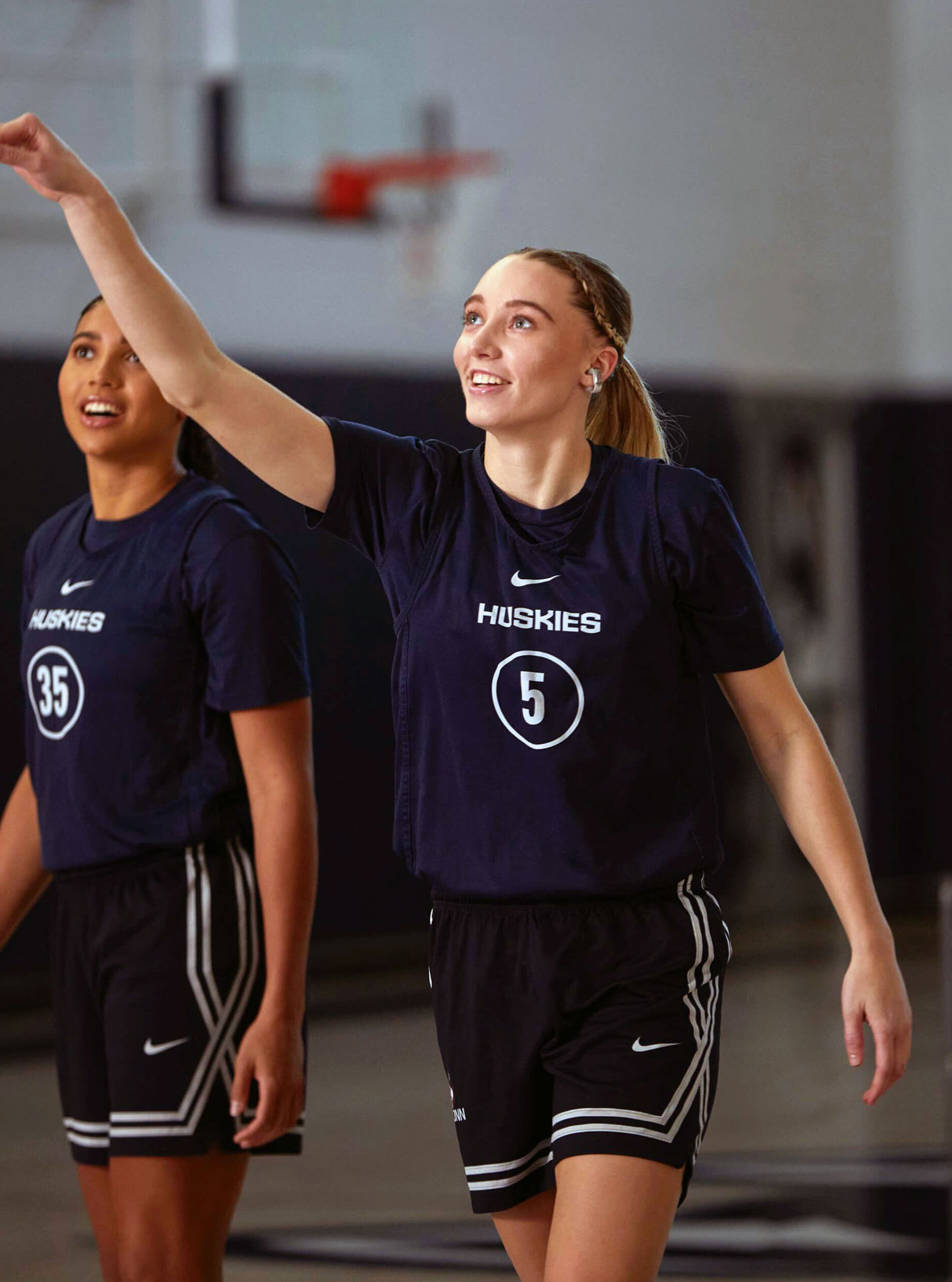Paige Bueckers AI Photos: What You Need To Know
Is the relentless glare of the digital age eroding the very foundations of privacy and consent? The recent unauthorized circulation of doctored images featuring prominent athletes like Paige Bueckers and Caitlin Clark underscores a troubling trend, exposing the vulnerability of public figures to malicious acts and the insidious spread of misinformation.
The story of Paige Bueckers, the UConn basketball star, took a somber turn in April when the news broke of unauthorized photos circulating online, marking a disturbing instance of privacy violation in the digital sphere. Bueckers, a rising star in the world of sports, found herself at the center of a controversy that highlighted the dark underbelly of the internet and the ease with which personal images can be manipulated and shared without consent.
The incident, which involved the unauthorized posting of explicit AI-generated photos, sparked outrage and concern across social media. The situation raised urgent questions about digital ethics, the responsibility of social media platforms, and the need for stronger protections against the non-consensual creation and distribution of intimate content. Bueckers, previously known for her prowess on the court and her public persona, was thrust into a situation that required her to navigate the complexities of privacy, image rights, and the relentless scrutiny of the online world.
The spread of such content is not just a violation of personal privacy; it can also lead to lasting emotional and psychological harm. The ease with which AI can now generate realistic but fabricated images poses a serious threat to individuals' reputations and well-being. The incident involving Bueckers also highlights the vulnerability of other female athletes, including Caitlin Clark, who were also targeted by this malicious act, revealing a pattern of abuse that demands immediate attention and action.
The widespread availability of such content online, with platforms like Pornhub and others hosting explicit material, has made it easier for malicious actors to target individuals. Furthermore, the use of deepfakes and AI-generated content has made it increasingly difficult to distinguish between genuine images and digitally altered ones. This creates a hostile environment for public figures and raises significant concerns about the potential for reputational damage, harassment, and even threats to personal safety.
The proliferation of such material in online spaces, especially those that cater to explicit content, is a growing concern. Websites and platforms that host such content often lack adequate measures to verify content authenticity, leading to the rapid and widespread dissemination of non-consensual images. This has the effect of normalizing the violation of privacy and creating an environment where individuals feel unsafe and exposed.
The situation prompted urgent responses, including statements from Bueckers herself, who addressed the incident directly. The use of AI in the creation of explicit content raises the stakes, as this technology enables realistic but fabricated images to be produced and circulated. It's a stark reminder of the potential for misuse of AI and the necessity of ethical guidelines and regulations to govern its application. The incident also underscores the urgent need for greater awareness and education about digital safety and responsible online behavior.
The incident regarding Bueckers and Clark has ignited a wider discussion about the ethics of using artificial intelligence to create and disseminate explicit content without consent. The misuse of such technology poses serious risks to the emotional and psychological well-being of individuals and has raised serious questions about the responsibilities of social media platforms in safeguarding user privacy.
The situation also highlights the need for strong legal frameworks and ethical guidelines to prevent the creation and distribution of non-consensual content. This includes holding those responsible for generating and sharing such content accountable and establishing mechanisms for swift removal and redress. The online world needs better safeguards to protect against malicious activities and protect individuals from the potential harm of non-consensual content.
The incident involving Paige Bueckers is a reflection of the larger issue of privacy and consent in the digital age. The misuse of AI technology has amplified the threat, and the rapid spread of fabricated content poses risks. This incident has highlighted a pressing need for responsible online conduct and a framework for protecting individuals in the digital realm.
| Category | Details |
|---|---|
| Full Name | Paige Marie Bueckers |
| Date of Birth | October 20, 2001 |
| Birthplace | Eden Prairie, Minnesota, USA |
| Nationality | American |
| High School | Hopkins High School |
| College | University of Connecticut (UConn) |
| Position | Guard |
| Professional Team | Dallas Wings (WNBA) |
| Major Achievements |
|
| Reference | WNBA Official Player Profile |
In response to the incidents, a number of voices have come forward to defend Clark and Bueckers, condemning the malicious actions and calling for greater respect for the athletes. Angel Reese, a former LSU Tigers star and current Chicago Sky forward, made a strong statement, which reflects the broader sentiment of solidarity and outrage within the basketball community. Public figures and athletes have used their platforms to shed light on the issue of privacy and the dangers of online harassment.
These acts of support emphasize the importance of protecting the rights of athletes and celebrities. The incidents reveal a pattern of abuse that demands a strong response, including legal action against those who generate and share non-consensual content. The digital world needs better safeguards to ensure the safety and well-being of everyone, especially high-profile individuals.
The controversy surrounding Bueckers and Clark has highlighted the broader issue of online privacy and the necessity of responsible online behavior. The ease with which AI-generated content can be disseminated creates a need for an intensified commitment to ethical conduct and digital safety. There is a need for greater awareness and understanding of digital ethics, along with strong legal frameworks and platform accountability to protect individuals from malicious actions.
The ongoing conversation about the exploitation of online spaces emphasizes the need for digital citizenship and media literacy. The discussion around the unauthorized dissemination of explicit content shows how easily privacy can be violated in the digital age. This situation demands strong measures to prevent the creation and distribution of non-consensual material and ensuring that digital spaces are safe for everyone.



